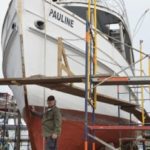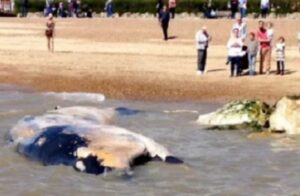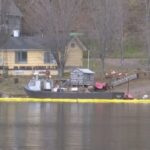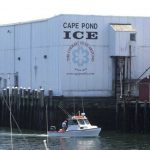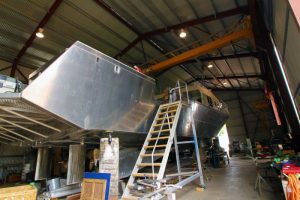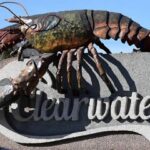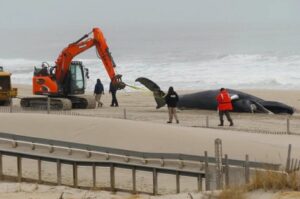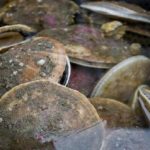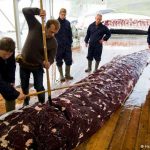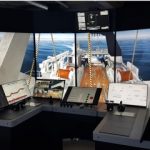Daily Archives: May 17, 2016
Bay of Fundy fishermen worried about fish stocks being destroyed by tidal turbine generators
 Four companies are planning on placing test turbines at the Fundy Ocean Research Centre for Energy. FORCE has a facility on land near Parrsboro that manages and monitors four berths for turbines in the Minas Passage. Kevin Gidney of Digby Neck was one of 50 fishermen who attended an information meeting in Annapolis Royal May 15. “Everybody is scared to death,” says Gidney. “The Minas Basin is the number one spawning ground for the Bay of Fundy. After a lobster lays its eggs on bottom, the larva float around on the surface, drifting around the basin with the tide. Are they going to get beat up in the turbines?” “The only thing they (FORCE) are saying to the general public is these fish can avoid, may avoid, or our studies suggest they will avoid the turbines,” said Porter. “In the hundreds of years we’ve been fishing them, there’s never been a fish who learned to avoid a weir, or a gillnet. Read the story here 20:05
Four companies are planning on placing test turbines at the Fundy Ocean Research Centre for Energy. FORCE has a facility on land near Parrsboro that manages and monitors four berths for turbines in the Minas Passage. Kevin Gidney of Digby Neck was one of 50 fishermen who attended an information meeting in Annapolis Royal May 15. “Everybody is scared to death,” says Gidney. “The Minas Basin is the number one spawning ground for the Bay of Fundy. After a lobster lays its eggs on bottom, the larva float around on the surface, drifting around the basin with the tide. Are they going to get beat up in the turbines?” “The only thing they (FORCE) are saying to the general public is these fish can avoid, may avoid, or our studies suggest they will avoid the turbines,” said Porter. “In the hundreds of years we’ve been fishing them, there’s never been a fish who learned to avoid a weir, or a gillnet. Read the story here 20:05
Dock death in Caraquet N.B. – WorkSafeNB investigates
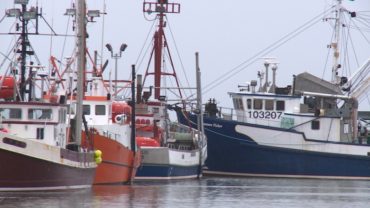 The mood remained tense on the dock at Caraquet Monday after a 40-year-old man was killed in an industrial accident there. Workers on the wharf were unloading a truck full of ice and transferring it to a boat when Gérald Doiron was killed. The exact cause of the death is under investigation, but it’s believed he was struck by ice that slid out of the truck, pinning him in the boat. Doiron worked for Provincial Trans Ltd. in Lamèque, delivering ice to fishing boats. A large dump truck was being used to move the 25 tonnes of ice from the truck to the fish hold of the boat. Two other men were injured in the accident, which WorkSafeNB is investigating. Read the rest here 18:34
The mood remained tense on the dock at Caraquet Monday after a 40-year-old man was killed in an industrial accident there. Workers on the wharf were unloading a truck full of ice and transferring it to a boat when Gérald Doiron was killed. The exact cause of the death is under investigation, but it’s believed he was struck by ice that slid out of the truck, pinning him in the boat. Doiron worked for Provincial Trans Ltd. in Lamèque, delivering ice to fishing boats. A large dump truck was being used to move the 25 tonnes of ice from the truck to the fish hold of the boat. Two other men were injured in the accident, which WorkSafeNB is investigating. Read the rest here 18:34
North Carolina Fisheries Association Weekly Update for May 16, 2016
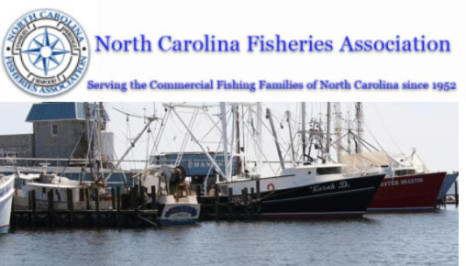 Click here to read the Weekly Update, to read all the updates, Click here 18:03
Click here to read the Weekly Update, to read all the updates, Click here 18:03
Fishermen in Orkney launch appeal for safety equipment
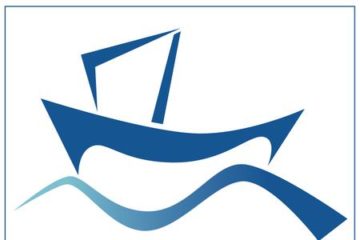 Fishermen in Orkney have started a crowdfunding appeal to raise money towards state-of- the- art radio rescue equipment, which could mean the difference between life and death at sea. The money raised through the online fundraiser JustGiving will support an application from the Orkney Fisheries Association to the European Maritime Fisheries Fund (EMFF). No public funds are normally made available for safety gear for fishermen despite the high fatalities in the industry. The association explains “Our fishermen are dads, boyfriends, husbands, pals, sons and brothers. We want to make sure that they have the same chance to come home safe from work as everyone else. However their work can be more dangerous than everyone else’s and sadly every year some are lost at sea.” Read the rest here 16:23
Fishermen in Orkney have started a crowdfunding appeal to raise money towards state-of- the- art radio rescue equipment, which could mean the difference between life and death at sea. The money raised through the online fundraiser JustGiving will support an application from the Orkney Fisheries Association to the European Maritime Fisheries Fund (EMFF). No public funds are normally made available for safety gear for fishermen despite the high fatalities in the industry. The association explains “Our fishermen are dads, boyfriends, husbands, pals, sons and brothers. We want to make sure that they have the same chance to come home safe from work as everyone else. However their work can be more dangerous than everyone else’s and sadly every year some are lost at sea.” Read the rest here 16:23
Listen – Todays Oversight Hearing on the Implications of President Obama’s National Ocean Policy
Following unsuccessful efforts to pass major national ocean policy legislation during three successive Congresses under both Democrat and Republican majorities, the Obama Administration initiated the development of a sweeping multi-agency federal management plan for oceans. This effort culminated with the July 2010 issuance by the White House of National Ocean Policy Executive Order 13547. Invited Witnesses: Mr. Dan Keppen Executive Director, Family Farm Alliance Klamath Falls, Oregon Ms. Elizabeth Kerttula Director, National Ocean Council Washington, D.C. Mr. Jim Lanard Chief Executive Officer, Magellan Wind Collingswood, New Jersey Ms. Meghan Lapp Fisheries Liaison, Seafreeze, Ltd. North Kingstown, Rhode Island Mr. Bob Zales President, National Association of Charterboat Operators Hurley, Mississippi 15:47
Two companies have proposed offshore wind farms in Hawaii
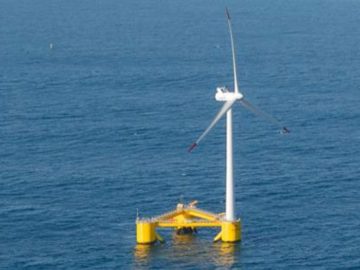 The federal Bureau of Ocean Energy Management, the agency that would decide whether to approve ocean leases for the projects, held a meeting about the proposals Monday. Among concerns raised so far is the potential danger that whales or submarines could bump into the cords anchoring the turbines to the ocean floor, said Henry Curtis, executive director of Life of the Land, a Hawaii nonprofit organization. “Do you want to really turn the ocean into the next industrial site?” Curtis asked. Some fishermen are concerned about the possible impact on birds flying over the sea. “The best fish spotters we have are birds,” said Ron Tam, secretary of the Hawaii Fishermen’s Alliance for Conservation and Tradition. “And then, are we going to be able to fish in and about and through these floating machines? We don’t know…That has a definite economic impact.” Read the rest here 11:42
The federal Bureau of Ocean Energy Management, the agency that would decide whether to approve ocean leases for the projects, held a meeting about the proposals Monday. Among concerns raised so far is the potential danger that whales or submarines could bump into the cords anchoring the turbines to the ocean floor, said Henry Curtis, executive director of Life of the Land, a Hawaii nonprofit organization. “Do you want to really turn the ocean into the next industrial site?” Curtis asked. Some fishermen are concerned about the possible impact on birds flying over the sea. “The best fish spotters we have are birds,” said Ron Tam, secretary of the Hawaii Fishermen’s Alliance for Conservation and Tradition. “And then, are we going to be able to fish in and about and through these floating machines? We don’t know…That has a definite economic impact.” Read the rest here 11:42
A battle between oil and fishing – How an oil industry fiasco saved Kachemak Bay 40 years ago
 The trouble in Homer in 1976 brought world attention to oil politics in the Alaska Legislature and vindicated fishermen who had been fighting oil drilling for three years politically and in court. On Sunday, I visited Clem Tillion at his home here on the south side of the bay, to recall those events. When he was a state senator, the George Ferris fiasco gave him the support he needed to pass a bill that had seemed to have little hope — buying back the leases and declaring Kachemak Bay a critical habitat area to be protected evermore. The issue also helped elect Jay Hammond as our only conservation-oriented governor — and he became the father of the Permanent Fund. And it set Homer on the path to be the eco-tourism center it is today rather than an oil town. Read the story here 09:30
The trouble in Homer in 1976 brought world attention to oil politics in the Alaska Legislature and vindicated fishermen who had been fighting oil drilling for three years politically and in court. On Sunday, I visited Clem Tillion at his home here on the south side of the bay, to recall those events. When he was a state senator, the George Ferris fiasco gave him the support he needed to pass a bill that had seemed to have little hope — buying back the leases and declaring Kachemak Bay a critical habitat area to be protected evermore. The issue also helped elect Jay Hammond as our only conservation-oriented governor — and he became the father of the Permanent Fund. And it set Homer on the path to be the eco-tourism center it is today rather than an oil town. Read the story here 09:30
Toxic ‘red tide’ in Chile prompts protests and investigation of salmon farming
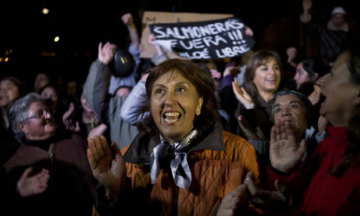 An algal bloom ‘of biblical proportions’ has led to protests and health emergency as concerns raised over dumping of rotting salmon in ocean. Chilean authorities are investigating the country’s salmon-farming industry after an algal bloom carrying a virulent neurotoxin spread for hundreds of miles along the rugged coastline of Patagonia, triggering a health emergency and angry protests by fishermen. The huge “Red Tide” has grown rapidly over recent weeks, in what has been described as the country’s worst environmental crisis in recent years: dozens of people have been poisoned by the algal bloom which makes seafood toxic and has deprived thousands of fishermen of a living. But the spotlight is now being focused on the salmon industry amid allegations that the algal bloom may have been exacerbated by the dumping of rotting salmon in the open ocean and the massive piles of salmon faeces and salmon food now smothering portions of the seafloor. Read the story here 08:24
An algal bloom ‘of biblical proportions’ has led to protests and health emergency as concerns raised over dumping of rotting salmon in ocean. Chilean authorities are investigating the country’s salmon-farming industry after an algal bloom carrying a virulent neurotoxin spread for hundreds of miles along the rugged coastline of Patagonia, triggering a health emergency and angry protests by fishermen. The huge “Red Tide” has grown rapidly over recent weeks, in what has been described as the country’s worst environmental crisis in recent years: dozens of people have been poisoned by the algal bloom which makes seafood toxic and has deprived thousands of fishermen of a living. But the spotlight is now being focused on the salmon industry amid allegations that the algal bloom may have been exacerbated by the dumping of rotting salmon in the open ocean and the massive piles of salmon faeces and salmon food now smothering portions of the seafloor. Read the story here 08:24

































